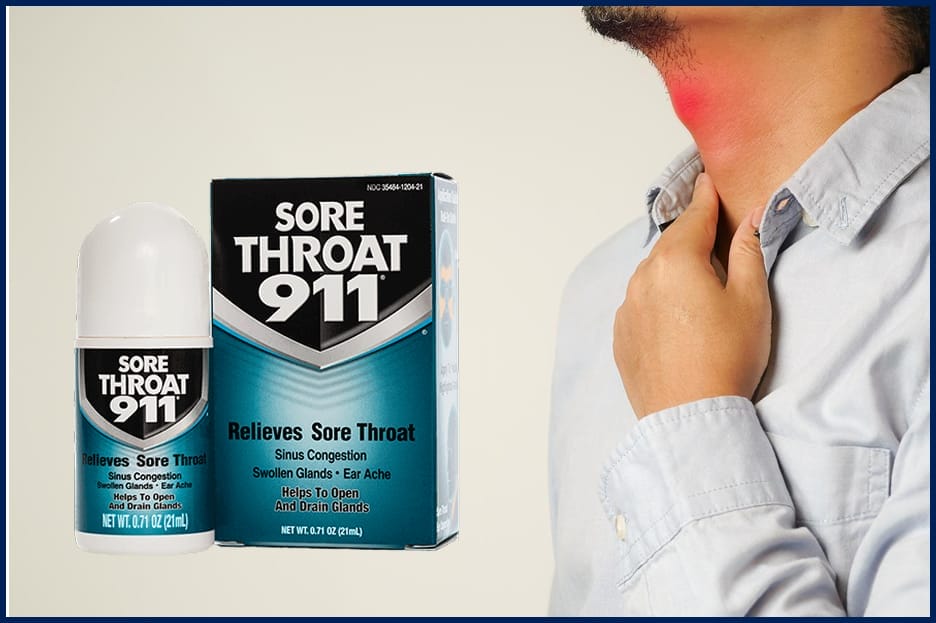A sore throat can turn simple tasks like eating and drinking into painful challenges. As we search for relief, ice cream often emerges as a go-to solution—but does this creamy comfort food actually help?
From scientific evidence to potential drawbacks, we’ll explore whether reaching for that cold, sweet treat is really your best option for soothing throat pain.

Beyond the Burn: What’s Really Happening in Your Throat
Most of us have experienced that dreaded scratchy sensation creeping up our throat—but what’s actually going on behind the scenes? Your sore throat could be the work of several different troublemakers. The most common culprit is a viral infection, like the common cold or flu, which causes inflammation and irritation of your throat tissues.
Bacterial infections, particularly strep throat caused by Group A Streptococcus bacteria, can create an even more intense experience. These bacteria can lead to severe pain, white patches on your tonsils, and swollen lymph nodes. Unlike their viral cousins, bacterial infections often require antibiotics to show them the door.
Allergies represent another significant cause of sore throats, particularly through their tendency to trigger postnasal drip. When mucus continuously drips down the back of your throat, it can leave you with persistent irritation and that annoying need to clear your throat constantly.
The discomfort scale of a sore throat can range from mildly annoying to downright debilitating. You might experience:
- A scratchy, burning sensation that feels like you swallowed sandpaper
- Difficulty swallowing, making even your morning coffee a challenge
- A voice that sounds like you’ve been to a three-day rock concert
- Sharp pain that shoots through your throat with every swallow
Finding relief isn’t just about comfort—it’s about maintaining your quality of life. A persistent sore throat can affect your sleep, making you more tired and irritable during the day. It can impact your eating habits, potentially leading to decreased nutrition when your body needs it most. For professionals who rely on their voice, like teachers or sales representatives, a sore throat can significantly impact their ability to perform their jobs effectively.
Moreover, the discomfort can make it difficult to stay hydrated, which is crucial for recovery from any illness. That’s why finding effective relief isn’t just about comfort—it’s about supporting your body’s natural healing process and maintaining your daily functions while you recover.

Understanding Ice Cream’s Appeal for Sore Throats
Ice cream is often considered a go-to remedy for sore throats due to its cooling and soothing properties. When the cold dessert comes into contact with inflamed throat tissue, it helps numb the area by temporarily reducing nerve sensitivity. This numbing effect can provide quick relief from discomfort, making swallowing less painful.
The creamy texture of ice cream also plays a role in soothing throat irritation. As it melts, it coats the throat, creating a smooth barrier that can minimize irritation from swallowing. Additionally, its soft consistency makes it easier to eat compared to solid foods, which may feel abrasive on an already sore throat. Soft foods and cold foods—which ice cream is both—are certain foods that help ease a sore throat.
While ice cream can offer temporary comfort, its effects are short-lived and vary from person to person. The combination of cold temperature and creamy texture provides immediate relief, but other factors—such as dairy content and sugar levels—may influence how beneficial it is in the long run.
Science Behind the Scoop: Evidence for Ice Cream’s Therapeutic Effects
Research demonstrates that cold temperatures can effectively reduce inflammation in throat tissue through vasoconstriction—the narrowing of blood vessels.
When ice cream makes contact with inflamed throat tissue, it initiates this response, potentially decreasing swelling and associated pain. Studies indicate that temperatures between 32-40°F (0-4°C) provide optimal anti-inflammatory benefits without causing tissue damage.
Ice cream serves as a valuable source of calories and nutrients during periods of illness when eating solid foods proves challenging. A typical serving contains essential proteins for healing, calcium for immune system support, readily available calories to maintain energy levels, and easily digestible and healthy fats for sustained energy. This combination of nutrients becomes particularly valuable when other foods may be too painful to consume.
The dairy content in ice cream contributes to hydration, a crucial factor in recovery from throat infections. While not as hydrating as water, ice cream’s composition is approximately 60% water, supplemented with electrolytes naturally present in dairy. This combination can help maintain fluid balance, which is particularly important when swallowing difficulties limit liquid intake.
Clinical studies on cold therapy (cryotherapy) support its effectiveness in pain management. The mechanism involves slowed nerve conduction velocity, which reduces pain signal transmission, decreased metabolic activity in inflamed tissue, reduced prostaglandin production, which mediates pain responses, and a temporary numbing effect on pain receptors.
However, it’s important to note that while these benefits are scientifically supported, most studies focus on cold therapy generally rather than ice cream specifically. The therapeutic effects primarily stem from temperature rather than the ice cream itself.
Note: If you are sensitive to dairy or cold products, hot or cold foods both offer temporary anti-inflammatory properties.

Foods to Avoid When You Have a Sore Throat
Certain foods can aggravate sore throats, increasing irritation and delaying recovery. Spicy foods and acidic foods, such as chili peppers and tomato-based sauces, can further inflame sensitive throat tissues, making discomfort worse. Crunchy or rough-textured foods like chips and toast may scratch the throat, while dairy products can trigger excess mucus production in some individuals, leading to congestion. Opting for soothing, nutrient-dense foods instead can help support healing without causing additional irritation.

Reasons Why Ice Cream May Not Be the Best Alternative
Despite its soothing properties, dairy in ice cream may increase mucus production in some individuals. Research suggests that casein protein can thicken existing mucus, potentially prolonging throat discomfort and congestion. This effect varies significantly among individuals but may be more pronounced in those with dairy sensitivity.
The high sugar content in typical ice cream can temporarily suppress immune system function. Studies indicate that consuming large amounts of sugar reduces white blood cell effectiveness for several hours, potentially slowing recovery from throat infections.
Extremely cold temperatures can cause throat muscle spasms and heightened sensitivity, particularly when consumed quickly. This temperature shock may worsen discomfort rather than relieve it. Additionally, rapid consumption of frozen treats can trigger brief but intense headaches.
Ice cream should be avoided during high fever, severe bacterial infections, or when experiencing significant swelling of the throat tissues. Those with dairy allergies, lactose intolerance, or compromised immune systems should consider alternative cold remedies. If taking certain antibiotics, particularly those affected by calcium, timing ice cream consumption appropriately is essential.
Related Article: Foods to Eat (and Avoid) When You Have a Sore Throat
So, Does Ice Cream Help a Sore Throat?
Yes, research suggests that ice cream can provide temporary relief from sore throat pain primarily through its cold temperature, which reduces inflammation and numbs nerve endings. However, conventional ice cream’s dairy and sugar content may counteract these benefits by increasing mucus production and potentially suppressing immune function.
For optimal throat-soothing benefits without unwanted side effects, consider these alternatives:
- No-sugar-added ice cream minimizes immune system impact while maintaining the beneficial cold temperature
- Frozen yogurt offers probiotics that may support immune function
- Fruit sorbets provide cold therapy and hydration without dairy complications
The key is moderation and proper timing—allowing ice cream to soften slightly before eating and consuming it slowly to avoid temperature shock. If you’re concerned about dairy or sugar effects, these alternatives can provide similar soothing benefits while supporting recovery.

A Better Solution: Sore Throat 911
SoreThroat911 is an innovative roll-on solution developed by the creator of Cramp911, offering relief for sore throat, sinus congestion, earache, and swollen glands. This 21ml/.71oz roll-on bottle features a specialized liquid vehicle that penetrates deeply into affected areas.
The large rollerball applicator ensures precise delivery across broad areas, making it ideal for treating both throat and lymph node discomfort. Each bottle provides hundreds of applications, making it a cost-effective solution for ongoing throat care.
Key features:
- Developed by an experienced pharmacist with over 10 years of testing
- Deep-penetrating formula for enhanced effectiveness
- Convenient roll-on application for targeted relief
- Large 21ml bottle for extended use
- Treats multiple conditions: sore throat, sinus issues, earache, swollen glands
Application is straightforward: simply roll onto the affected area at the first sign of discomfort, whether it’s a scratchy throat or swollen lymph nodes. The unique delivery system ensures the medication reaches deep into the tissue where it’s needed most.
This product resulted from extensive testing and refinement based on feedback from medical professionals, family, and patients before being made available to the public.
Making Smart Choices for Throat Relief
While ice cream can provide temporary comfort through its cooling effects, the potential drawbacks of dairy and sugar content make it a less-than-ideal solution for sore throat relief. Alternative options like sugar-free varieties and sorbets offer similar benefits with fewer risks.
However, for those seeking targeted, long-lasting relief, SoreThroat911’s specialized roll-on formula provides a more effective solution by directly addressing both pain and inflammation without the complications of traditional remedies.


